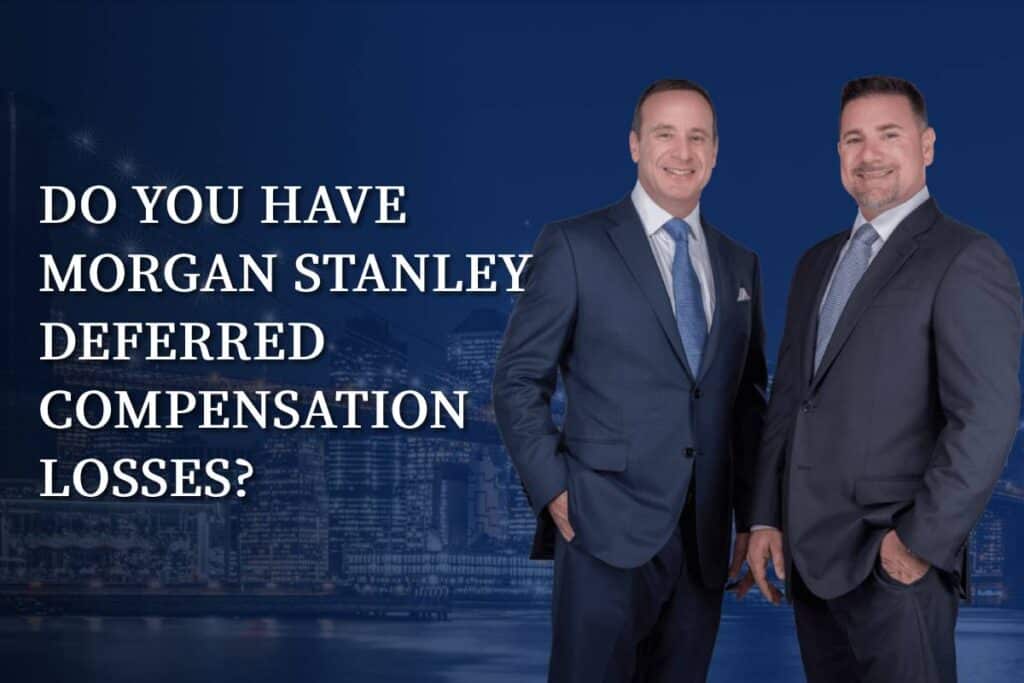The securities lawyers at KlaymanToskes are pursuing arbitration claims against Morgan Stanley (CRD#: 149777) on behalf of financial advisors and brokers who have resigned from Morgan Stanley and have not been paid their deferred compensation plans.
This investigation follows a recent court ruling in Shafer, et al. v. Morgan Stanley, et al. (Case 1:20-cv-11047-PGG). In this case, the Court determined that Morgan Stanley’s deferred compensation plans are protected under ERISA as “individual account plans.” These plans were classified as deferred compensation with individual accounts for each participant, funded by contributions.
Financial advisors who left Morgan Stanley within the last six years and had their deferred compensation plans withheld can pursue individual arbitration claims through FINRA to recover their financial losses. This ruling is important for financial advisors because it recognizes that deferred compensation plans are protected under ERISA, meaning these plans are legally considered retirement funds.
Financial advisors and brokers that suffered deferred compensation losses when they left Morgan Stanley are encouraged to contact attorney Lawrence L. Klayman, Esq., at 888-997-9956 or by email at investigations@klaymantoskes.com to discuss recovery options. We do not collect attorney’s fees unless we are able to obtain a financial recovery for you.
If you left Morgan Stanley within the last six years and had your deferred compensation plan withheld, you may be entitled to recover those funds through FINRA arbitration. A 2024 court ruling confirmed that these plans are protected under ERISA, making any withholding a violation of ERISA law.
Contact KlaymanToskes to explore your options and take the first step towards reclaiming your financial security.
Morgan Stanley is seeking intervention from the U.S. Second Court of Appeals (according to a May 24 court filing) after losing multiple claims from advisors alleging the improper withholding of their deferred compensation. The wirehouse contends that U.S. District Judge Paul G. Gardephe’s decision, which included ruling that their deferred compensation plan falls under federal pension laws, has adversely affected its ability to defend itself in arbitration and led to an increase in new arbitration claims.
Despite Morgan Stanley’s efforts to revise the ruling, ex-brokers have been successful in arbitration, winning significant back pay awards. Morgan Stanley’s attempts to challenge the ruling continue, highlighting the ongoing dispute’s potential broad implications for deferred compensation plans across industries.
In this class action case, several former Morgan Stanley financial advisors challenged the firm’s deferred compensation plans, claiming that Morgan Stanley violated the Employee Retirement Income Security Act (ERISA) by withholding deferred compensation when advisors left the firm. The plaintiffs argued that these compensation plans should be classified as ERISA-protected pension plans, which would make the deferred compensation vested and non-forfeitable.
The Court dismissed the class action and ordered plaintiffs to arbitrate their claims, however the ruling determined that Morgan Stanley’s deferred compensation plans are indeed covered under ERISA.
This classification means that the compensation is protected under federal law, making it unlawful for Morgan Stanley to withhold these funds when advisors leave the firm. The ruling significantly strengthens the position of former advisors in seeking to recover their withheld compensation through individual FINRA arbitration claims. The Court’s decision emphasizes the importance of ERISA protections for deferred compensation plans and sets a precedent for similar cases in the future.
What does this mean?
The Court’s ruling that Morgan Stanley’s deferred compensation plans are covered under ERISA has significant implications for financial advisors and brokers who previously worked at the firm. This decision means that:
Overall, the Court’s decision empowers former Morgan Stanley financial advisors and brokers to take legal action to recover deferred compensation that was unlawfully withheld, offering them a stronger chance of success in their claims.

Yes, you can seek recovery through FINRA arbitration. Per the ruling of Shafer, et al. v. Morgan Stanley, et al., your only option to seek a recovery for your deferred compensation losses is through arbitration.
Unlike traditional lawsuits and class action lawsuits, FINRA arbitration offers a much faster and more efficient way to resolve disputes. This process is specifically designed for the financial industry and provides a forum to address claims such as the unlawful withholding of deferred compensation.
FINRA recommends that you have an attorney represent you during arbitration or mediation proceedings, as they can provide valuable experience, direction, and advice. Brokerage firms, like Morgan Stanley, are generally represented by an attorney in arbitration proceedings. Even if you choose not to hire an attorney, you may be facing one on the other side.
Contact attorney Lawrence L. Klayman, Esq., at 888-997-9956 or by email at investigations@klaymantoskes.com to discuss your eligibility and the steps to take in pursuing a FINRA arbitration claim. No attorney’s fees will be collected unless we secure a financial recovery for you. Take action now to recover your deferred compensation from Morgan Stanley.
Financial advisors and brokers who have resigned from Morgan Stanley within the last six years and lost their deferred compensation plans are eligible to pursue recovery. Following the recent ruling in Shafer, et al. v. Morgan Stanley, et al. (Case 1:20-cv-11047-PGG), there is a high likelihood of recovering these losses.
The court determined that deferred compensation plans fall under ERISA, meaning they are protected as retirement funds. Forfeiting your deferred compensation plan upon leaving Morgan Stanley was a violation of ERISA law, as retirement money cannot be unlawfully withheld.
Therefore, eligible individuals can file an individual FINRA arbitration claim against Morgan Stanley to recover the funds that were illegally withheld or unpaid. The Court’s holding significantly strengthens FINRA arbitration claims against Morgan Stanley based on the applicability of ERISA and Morgan Stanley’s violation of it.